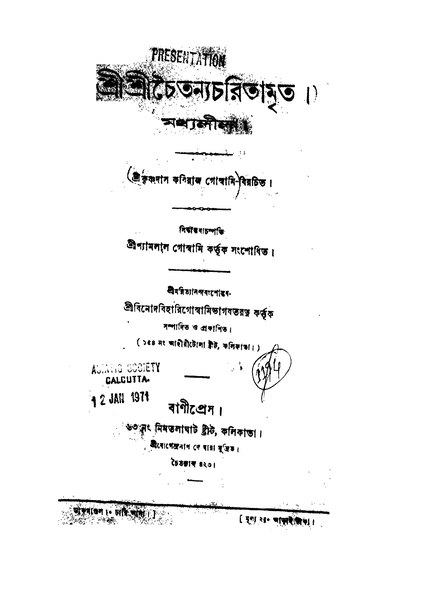
Shri Shri Chaitanya Charitamrita – Madhya Lila, Goswami, Krishnadas Kabiraj, 622p, LANGUAGE. LINGUISTICS. LITERATURE, bengali (1909)
CC Madhya 13.76
daṇḍavat kari, prabhu yuḍi’ dui hāta
ūrdhva-mukhe stuti kare dekhi’ jagannātha
Synonyms:
daṇḍavat kari — offering obeisances; prabhu — Śrī Caitanya Mahāprabhu; yuḍi’ — folding; dui hāta — two hands; ūrdhva-mukhe — raising the face upward; stuti kare — offers prayer; dekhi’ — seeing; jagannātha — the Deity of Lord Jagannātha.
Translation:
Offering obeisances to the Lord with folded hands, Śrī Caitanya Mahāprabhu raised His face toward Jagannātha and prayed as follows.
CC Madhya 13.77
namo brahmaṇya-devāya
go-brāhmaṇa-hitāya ca
jagad-dhitāya kṛṣṇāya
govindāya namo namaḥ
Synonyms:
namaḥ — all obeisances; brahmaṇya-devāya — to the Lord worshipable by persons in brahminical culture; go-brāhmaṇa — for cows and brāhmaṇas; hitāya — beneficial; ca — also; jagat-hitāya — to one who always is benefiting the whole world; kṛṣṇāya — unto Kṛṣṇa; govindāya — unto Govinda; namaḥ namaḥ — repeated obeisances.
Translation:
“ ‘Let me offer my respectful obeisances unto Lord Kṛṣṇa, who is the worshipable Deity for all brahminical men, who is the well-wisher of cows and brāhmaṇas, and who is always benefiting the whole world. I offer my repeated obeisances to the Personality of Godhead, known as Kṛṣṇa and Govinda
CC Madhya 13.78
jayati jayati devo devakī-nandano ’sau
jayati jayati kṛṣṇo vṛṣṇi-vaṁśa-pradīpaḥ
jayati ja
yati megha-śyāmalaḥ komalāṅgo
jayati jayati pṛthvī-bhāra-nāśo mukundaḥ
Synonyms:
jayati — all glories; jayati — all glories; devaḥ — to the Supreme Personality of Godhead; devakī-nandanaḥ — the son of Devakī; asau — He; jayati jayati — all glories; kṛṣṇaḥ — to Lord Kṛṣṇa; vṛṣṇi-vaṁśa-pradīpaḥ — the light of the dynasty of Vṛṣṇi; jayati jayati — all glories; megha-śyāmalaḥ — to the Supreme Personality of Godhead, who looks like a blackish cloud; komala-aṅgaḥ — with a body as soft as a lotus flower; jayati jayati — all glories; pṛthvī-bhāra-nāśaḥ — to the deliverer of the whole world from its burden; mukundaḥ — the deliverer of liberation to everyone.
Translation:
“ All glories unto the Supreme Personality of Godhead, who is known as the son of Devakī! All glories to the Supreme Personality of Godhead, who is known as the light of the dynasty of Vṛṣṇi! All glories to the Supreme Personality of Godhead, whose bodily luster is like that of a new cloud, and whose body is as soft as a lotus flower! All glories to the Supreme Personality of Godhead, who appeared on this planet to deliver the world from the burden of demons, and who can offer liberation to everyone!
CC Madhya 13.79
jayati jana-nivāso devakī-janma-vādo
yadu-vara-pariṣat svair dorbhir asyann adharmam
sthira-cara-vṛjina-ghnaḥ susmita-śrī-mukhena
vraja-pura-vanitānāṁ vardhayan kāma-devam
Synonyms:
jayati — eternally lives gloriously; jana-nivāsaḥ — He who lives among human beings like the members of the Yadu dynasty and is the ultimate resort of all living entities; devakī-janma-vādaḥ — known as the son of Devakī (No one can actually become the father or mother of the Supreme Personality of Godhead. Therefore devakī-janma-vāda means that He is known as the son of Devakī. Similarly, He is also known as the son of mother Yaśodā, Vasudeva or Nanda Mahārāja.); yadu-vara-pariṣat — served by the members of the Yadu dynasty or the cowherd men of Vṛndāvana (all of whom are constant associates of the Supreme Lord and are the Lord’s eternal servants); svaiḥ dorbhiḥ — by His own arms, or by His devotees like Arjuna, who are just like His own arms; asyan — killing; adharmam — demons or the impious; sthira-cara-vṛjina-ghnaḥ — the destroyer of all the ill fortune of all living entities, moving and not moving; su-smita — always smiling; śrī-mukhena — by His beautiful face; vraja-pura-vanitānām — of the damsels of Vṛndāvana; vardhayan — increasing; kāma-devam — the lusty desires.
Translation:
“ Lord Śrī Kṛṣṇa is He who is known as jana-nivāsa, the ultimate resort of all living entities, and who is also known as Devakī-nandana or Yaśodā-nandana, the son of Devakī and Yaśodā. He is the guide of the Yadu dynasty, and with His mighty arms He kills everything inauspicious, as well as every man who is impious. By His presence He destroys all things inauspicious for all living entities, moving and inert. His blissful smiling face always increases the lusty desires of the gopīs of Vṛndāvana. May He be all-glorious and happy!’
CC Madhya 13.80
nāhaṁ vipro na ca nara-patir nāpi vaiśyo na śūdro
nāhaṁ varṇī na ca gṛha-patir no vanastho yatir vā
kintu prodyan-nikhila-paramānanda-pūrnāmṛtābdher
gopī-bhartuḥ pada-kamalayor dāsa-dāsānudāsaḥ
Synonyms:
na — not; aham — I; vipraḥ — a brāhmaṇa; na — not; ca — also; nara-patiḥ — a king or kṣatriya; na — not; api — also; vaiśyaḥ — belonging to the mercantile class; na — not; śūdraḥ — belonging to the worker class; na — not; aham — I; varṇī — belonging to any caste, or brahmacārī (A brahmacārī may belong to any caste. Anyone can become a brahmacārī, or lead a life of celibacy.); na — not; ca — also; gṛha-patiḥ — householder; no — not; vana-sthaḥ — vānaprastha, one who, after retirement from family life, goes to the forest to learn how to be detached from family life; yatiḥ — mendicant or renunciant; vā — either; kintu — but; prodyan — brilliant; nikhila — universal; parama-ānanda — with transcendental bliss; pūrṇa — complete; amṛta-abdheḥ — who is the ocean of nectar; gopī-bhartuḥ — of the Supreme Person, who is the maintainer of the gopīs; pada-kamalayoḥ — of the two lotus feet; dāsa — of the servant; dāsa-anudāsaḥ — the servant of the servant.
Translation:
“ I am not a brāhmaṇa, I am not a kṣatriya, I am not a vaiśya or a śūdra. Nor am I a brahmacārī, a householder, a vānaprastha or a sannyāsī. I identify Myself only as the servant of the servant of the servant of the lotus feet of Lord Śrī Kṛṣṇa, the maintainer of the gopīs. He is like an ocean of nectar, and He is the cause of universal transcendental bliss. He is always existing with brilliance.’
